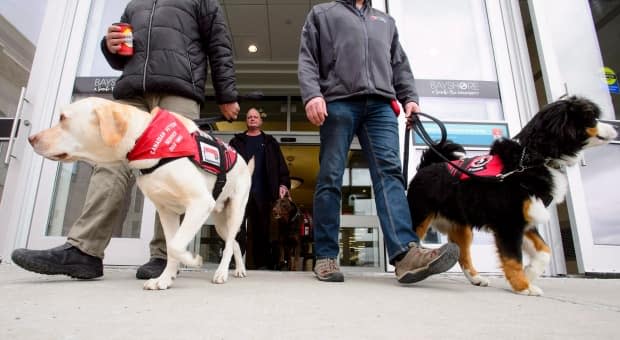Conservatives call for national standards on service dogs for veterans with PTSD

The Conservative party is calling on the federal government to develop national standards for the certification of psychiatric service dogs to improve access for veterans with post-traumatic stress disorder (PTSD).
John Brassard and Pierre Paul-Hus, the party's veterans affairs and public service critics, said national standards are needed to ensure uniform access for veterans and training for dogs across all provinces.
"Veterans and support services face barriers and devastating denial of care because there is no recognized national standard," they said in a joint statement.
Parliament's veteran affairs committee had been studying the issue of national standards during the spring — but with an election call widely expected later this month, that committee likely won't be able to publish a final report.
Brassard and Paul-Hus said if an election is called, the work of the committee will be lost and the government should enact some standards as soon as possible.
"Canadian national standards are urgently required to improve equality of access for all veterans in need," they said in their statement.
Phil Ralph is director of health services at Wounded Warriors Canada, which provides mental health services to veterans. He said national standards would help to avoid a patchwork system.
"There needs to be a consistent application of understanding what a service dog does," he said.
Wounded Warriors has contributed over $3 million to training service dogs and pairing them with veterans since 2012. It relies on various international bodies, such as Assistance Dogs International, to guide its program's standards.
Ralph said he thinks the federal government needs to take the lead and draft national regulations.
"The reason we have our own [standards] is because there is an absence of them. There's a vacuum," he said.
Government says more research needed
When asked if the government would commit to national standards, a spokesperson for Veteran Affairs Minister Lawrence MacAulay said there hasn't been enough research on the use of service dogs.
"We recognize that there is significant interest in using service dogs to assist veterans with mental health conditions, however, there is limited research surrounding its safety and effectiveness," MacAulay's director of communications John Embury said in an email.
"We continue to monitor any additional studies that have been conducted by our allies."
NDP veteran affairs critic Rachel Blaney said she supports the idea of national standards.
"Without these standards, there are so many broken pieces that create this fragmented framework that leaves veterans behind," she said in a statement.
Standards long proposed, never materialized
National standards for service dogs have been proposed for years. The Conservatives first pledged funding for research into the benefits of service dogs for veterans when they were in government in 2014.
Just prior to the 2015 election campaign, then veterans affairs minister and current Conservative leader Erin O'Toole announced that national standards for service dogs would be set by the federal government.
After the Liberals took power, a study was conducted and released in 2017 that was meant to pave the way for national standards.
But the Canadian General Standards Board, the federal regulating agency, pulled out of the project in 2018, putting a damper on the push for national regulations.
Although it was met with some criticism, the 2017 study found that service dogs can have a number of positive effects on people living with PTSD: detecting and preventing crises, improved sleep, fewer nightmares, better concentration, improved self-confidence and increased social participation.
Ralph said there has been enough discussion on the topic for standards to be implemented and that the government should follow through on it.
"We've done actually the hard leg work, so just get on with it," he said.

